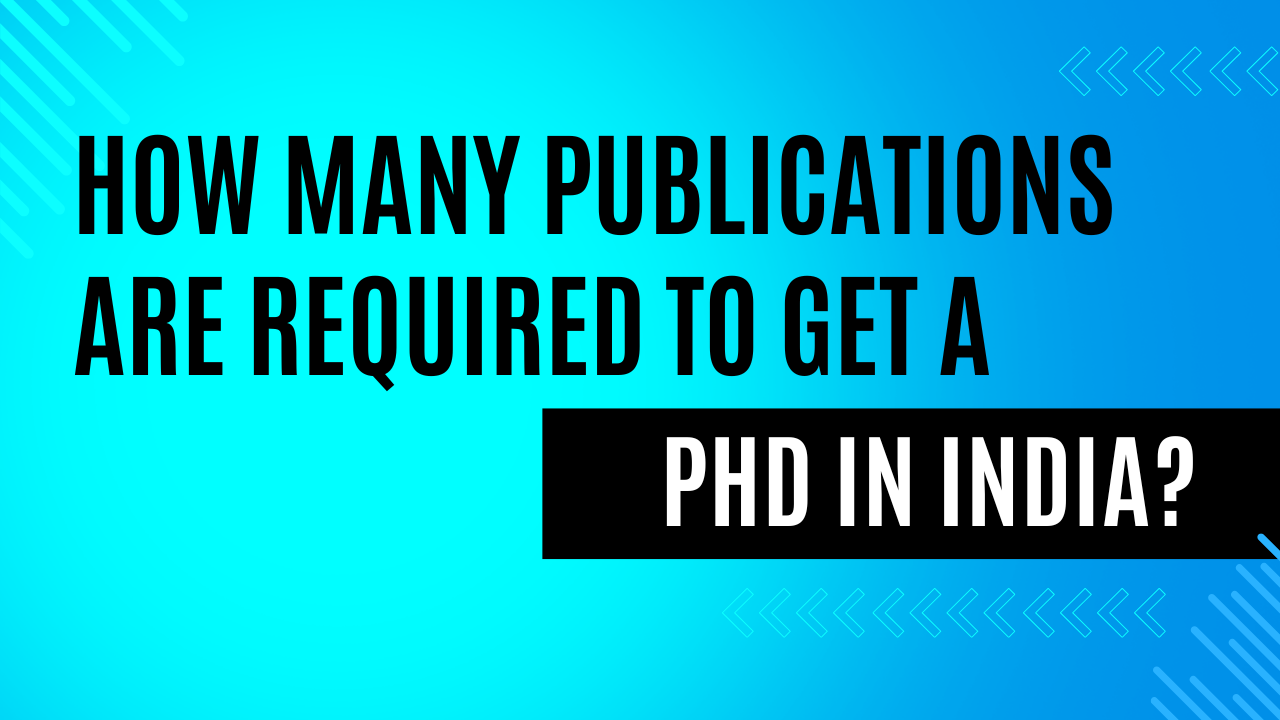How Many Publications Are Required to Get a PhD in India?
Kenfra Research - Shallo2025-01-10T13:49:19+05:30When pursuing a PhD in India, one of the crucial aspects that aspiring doctoral candidates need to understand is the requirement for academic publications. As a doctoral candidate, the expectation for publishing research is not only a way to contribute to the academic community but also a significant milestone in your journey to obtaining a PhD. But the question that often arises is: How many publications are required to get a PhD in India?
The answer to this question can vary depending on several factors, including the specific university or institution, the field of study, and the nature of the research. In this blog post, we will explore the general guidelines, factors affecting publication requirements, and tips for PhD students to successfully meet these expectations.

Understanding the Role of Publications in a PhD Program
Publications are an essential component of a PhD program in India because they demonstrate a student’s ability to conduct high-quality research, engage with current academic discussions, and contribute to the knowledge base of their field. They act as a validation of the research work done throughout the PhD journey and help establish credibility in the academic community.
In India, universities and institutions typically expect doctoral candidates to have published at least two to three research papers in reputed national or international journals before submission of their final thesis. However, some institutions may have more specific or higher requirements based on their policies.
Factors Influencing Publication Requirements
Institutional Guidelines
Every institution may have different rules regarding the number of publications required for PhD candidates. For instance:
- IITs, IISc, and NITs may have more stringent publication requirements due to the high standards of research excellence they maintain. These institutions might require candidates to have published in SCI/Scopus-indexed journals.
- State universities or private universities may have more flexible publication guidelines, although they still emphasize the importance of publishing.
Therefore, it is important to consult the PhD regulations of your specific university to understand the publication requirements for your program.
Field of Study
The number of publications required may differ depending on the discipline. For instance:
- In engineering, science, or technology, publications in international journals and conferences are often considered essential.
- For fields such as humanities and social sciences, publications might not be as heavily emphasized, although presenting papers at national or international conferences may still be valuable.
Some disciplines, such as clinical research, might require publications in peer-reviewed medical journals, which hold significant weight in academic evaluations.
Type of Publication
The quality of the publication is just as important as the quantity. Publishing in high-impact journals or presenting at international conferences holds much more value than publishing in local or low-ranking journals. It is advisable to aim for publications in peer-reviewed journals indexed in Scopus, Web of Science, or PubMed, as these are considered credible and are more likely to be recognized during your PhD evaluation.
Additionally, publications should ideally be based on original research that adds value to the field, rather than review papers or secondary research. Research that opens up new avenues or addresses significant gaps in existing literature is often favored.
Typical Publication Requirements for a PhD in India
While the exact number of publications varies, here’s a general guideline for the number of publications required during the course of your PhD in India:
- Minimum of Two Publications
Most universities in India expect students to have published at least two research papers by the time they submit their thesis. These should generally be in peer-reviewed journals with good impact factors. Some universities may also allow conference proceedings to count toward this requirement, although they generally prefer journal publications.
- Conference Presentations
Presenting papers at conferences is another common requirement. Although conferences are not considered a substitute for journal publications, they are an important part of academic networking and peer review. A paper presented at an international conference may be considered a valuable contribution to your research credentials.
- Discipline-Specific Variations
Some fields of study may have more specific publication expectations. For example, in engineering and science disciplines, multiple publications are often required, especially if the research is of a technical nature. Conversely, social sciences and humanities PhD students might need fewer publications, but conferences, book chapters, or collaborations with research groups may still be encouraged.
Why Are Publications Important for Your PhD?
Publications are a critical element of your PhD journey for several reasons:
- Academic Recognition: Publishing your research in journals helps you gain recognition as an expert in your field. It establishes your credibility and builds your academic reputation.
- PhD Completion: Many universities in India won’t allow you to submit your thesis without meeting the publication requirements. Therefore, timely publication of research papers is essential for completing your PhD on time.
- Career Advancement: Publishing is essential if you want to pursue an academic career or a role in research and development. Many employers, especially in academia, look for candidates who have a strong publication record.
Tips for Meeting Publication Requirements
- Start Early: Begin your publication journey as soon as possible. Publish papers related to your research even if they’re still in the preliminary stages. The earlier you start, the more time you’ll have to make revisions and aim for higher-impact journals.
- Collaborate with Your Advisors: Engage with your PhD advisors and mentors when drafting research papers. Their feedback and guidance are invaluable, and they may have connections that could help with the publication process.
- Focus on Quality: Rather than focusing on the quantity of publications, emphasize the quality and impact of the journals or conferences where you publish your research.
Conclusion
In conclusion, the number of publications required to complete a PhD in India varies, but it is typically two to three publications in reputable journals or conferences. The key is to focus on publishing high-quality, original research in indexed journals. Ensure you understand the publication requirements specific to your university and field of study and start your publishing journey early.








Leave a Reply